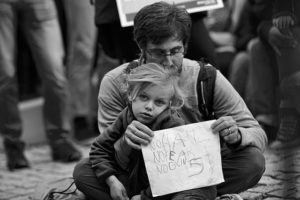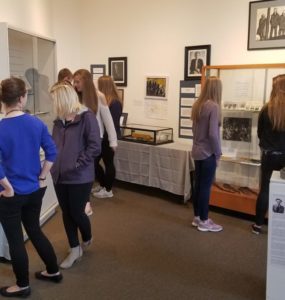A Tale of Two Principals
This week, two principals made the front page of the news for widely different reasons. Their stories raise thought-provoking questions about how the Holocaust should be taught.

The first, shocking story was that of Principal William Latson, head of Spanish River High School in Palm Beach, Florida. In 2018, a mother (who preferred to remain unnamed) wrote asking how the Holocaust was being taught. His response? Lessons were “not forced upon individuals as we all have the same rights but not all the same beliefs.” Compounding her shock, Latson continued in an email, “Not everyone believes the Holocaust happened…” “I can’t say the Holocaust is a factual, historical event because I am not in a position to do so as a school district employee.” He added that he personally believes in history.
After the subsequent outrage, Latson spent several days at the United States Holocaust Memorial Museum (USHMM), but he did not put in place broad Holocaust education requirements that parents felt were essential.
After the brouhaha, Latson was removed as principal and reassigned.
This incident raises many questions about Holocaust education which, as our country becomes more divided, become more difficult.
Who decides what topics are taught?
How much time and resources are devoted to Holocaust education?
Should this be mandatory, like math and spelling? How do you make timeless lessons relevant to younger generations?
What other painful historical topics should we include—our government’s treatment of Native Americans? Slavery? Internment of citizens of Japanese descent in World War 2? Other genocides?
The USHMM has suggested topics and resources for educators. Their lessons are broader than antisemitism. It starts with silence and being bystanders to suffering or attacks on others. It begins with othering and scapegoating. They add that the Holocaust “occurred because individuals, organizations, and governments made choices that not only legalized discrimination but also allowed prejudice, hatred, and ultimately mass murder to occur.”
It’s essential for students to understand the process that led up to the genocide and how groups of people can be pitted against each other, resulting in violence and murder. Others stress that we expose students as much as possible to the few remaining Holocaust survivors and witnesses, to counter Holocaust denial. As part of such revisionist history, Kira Goldring reminds us that in 2018, Poland passed a bill, an example of revisionist history, that criminalized mention of the mixed role Poland had during the Holocaust.

Goldring and others also offer several legitimate reasons why schools should not provide Holocaust education that merit discussion. First, many schools lack the time or resources to educate properly and may do more harm than good. I would argue that it reflects the school’s priorities and should be changed.
Another is that, while it appropriately paints Germany in a bad light, that does not reflect current Germany. I have had to work hard to overcome the anti-German prejudice I was raised with. Angela Merkel’s compassionate response to the refugee crisis dramatically changed my perspective on the country. I’ve also learned how much young Germans have done to atone and ensure that their generation does not repeat atrocities. Holocaust education there happens through visits to schools and programs such as the March for Life. My aunt Kati, a survivor of Auschwitz and Allendorf, told me about her visit back to Allendorf at the invitation of the townspeople. They held a “reunion” of the former slave laborers, for both education and reconciliation.
Another argument against Holocaust education is that this traumatizes generations of children. While I agree that growing up in the shadow of the Holocaust has been traumatic, and I see that I have passed some of my fears to my children, I think it is critical to not erase history. Additionally, the regular active shooter drills teachers and students are now subjected to is likely far more traumatizing and is something I oppose.
One can also focus education on moral actions in response to the Holocaust, on countering racism and bigotry, and on resistance and resilience.
In the second case this week, the focus was on a Black principal’s response to a group of white students actions. Was this a prank or a hate crime? The Howard County community and Glenelg High School are divided. I’ll discuss this in an upcoming post.
How do your communities approach Holocaust education? What has been the most successful?
